Overlanding puts a different spin on your world, causes you to think differently about ‘life, the universe and everything’. After seven years overlanding, we’re on a covid-induced hiatus in Canada, skiing our socks off through the winter. Yes folks… the struggle is real. But we can’t ski every day. On foggy days we get chance to ponder little overlanding nuggets like: why is it really so terrible to be a fast traveller? Is 15 minutes bartering with a third-world trader over $1 really time well spent? Will Officer Sanchez really arrest us if we don’t chip-in to his coffers? And why is orange jam called marmalade?

1. Learning the Pace: Slow -v- Fast Travel
Ever heard the tortoise and hare story? Fast hare screws-up, slow tortoise wins the day. A scan through overlanders’ social media groups might lead to the same conclusion: fast travel = bad thing.
What we’ve learned from meeting countless overlanders on the road, is that everyone’s on their own journey with their own priorities, their own timescales, their own rigs and their own budgets. But announce on social media that you plan to drive from Alaska to Argentina, or from Cairo to Cape Town in six months and you’ll probably get a bash-down. At best you’ll receive polite suggestions to halve your distance and ‘take your time’; at worst you’ll suffer outright derision and ridicule. Why is this? Why are some slow travellers convinced that their way is the way for others to travel?
For what it’s worth, at this time in our lives, we happen to like slow travel. We’ve been overlanding full-time, but slowly, over four continents for seven years so far. We’re fortunate to have the time, money and good health to do this, but this wasn’t always the case.
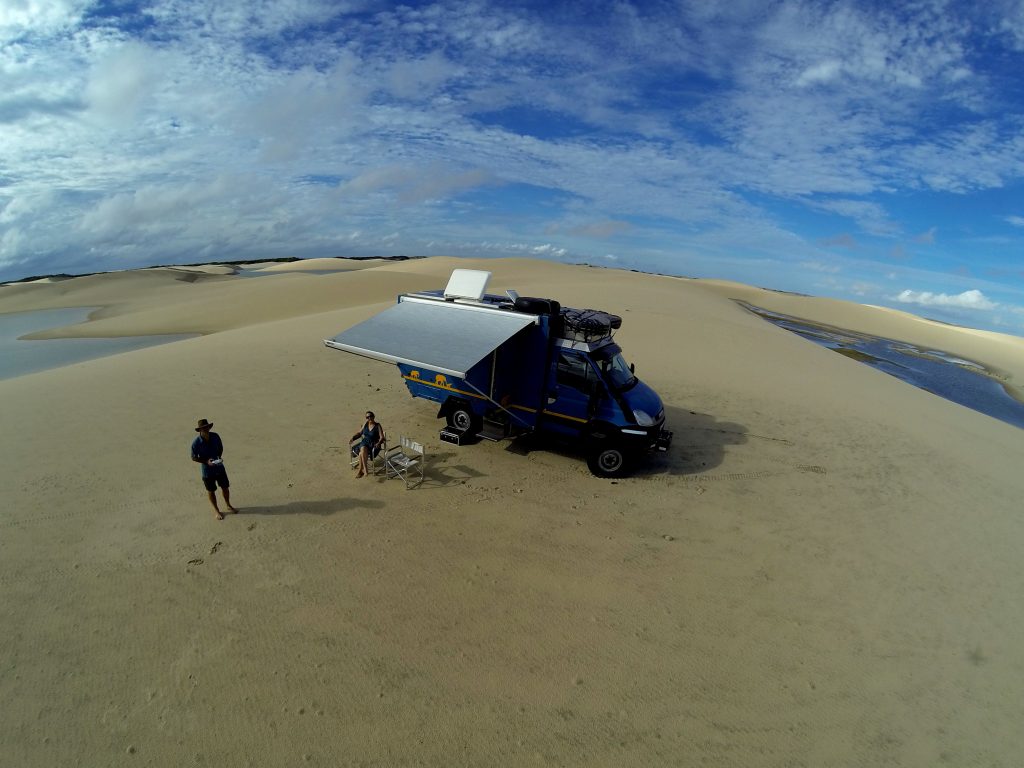
Once, we had the limited time of short breaks. We were young, energetic and crammed as much as possible into the precious time. Whizzing around India at break-neck speed; covering over 5,000km of African bush-driving in a mere three weeks; backpacking large chunks of South East Asia in just a couple of months; skipping all over Venezuela in a few weeks…. you get the idea. Time was tight, but it was exciting to see a place, spend an evening chatting to people, then move on. These were essentially scouting, idea-picking trips… where to go back to (or more importantly, where not to go back to) one day.
It’s not only the young who might have reason to travel fast. We’ve had the good fortune to meet one or two ‘senior’ overlanders moving at a pace to challenge the Starship Enterprise’s warp-factor. They looked well, but had serious underlying health issues which meant their short remaining time was precious. They wanted to get out and tick those boxes off the bucket list. No time to ‘smell the coffee’ – it was go, go, go for them, and they must surely be admired for this.
The thing is… it doesn’t suit everyone to ‘slow down and smell the coffee’. We have sympathy for those setting-off on their personal dream-trip only to have their plans critiqued, or even ripped apart, by slow travellers telling them they’re not doing it ‘right’. We’ve learned that if we want to do a speedy London to Singapore in 2 months, then we’ll do it. None of this ‘just go to Istanbul instead’ nonsense. Sometimes we’ll be the tortoise, sometimes the hare… either way, we’ll get where we want to be, in our own time.
2. Learning to Pay More: the ‘Tourist Tax’
“Hey… Señor Lopez paid only $x, but I’m paying $xyz… how so?”. It’s not unusual in some countries to find one price for locals, another price for ‘rich’ johnny-foreigner. “But I’m not rich…” Mr/Ms Average Overlander would say, “I’m just a poor cash-strapped traveller who bought a van to see the world”. The clue, we think, is in the ‘bought a van’ and ‘see the world’. To Señor Lopez, wondering how he’s going to feed his kids next week, most overlanders seem pretty well-heeled by comparison. Okay… might be true… but simply because we can pay more, does that mean we should pay more?
First let’s consider entry fees for national heritage attractions eg: museums, historical sites or public parks. We met a couple in Peru who couldn’t afford to take their child to a local museum to see their own national Inca treasures. Surely this can’t be right, eh? Shouldn’t all citizens, regardless of wealth, have the opportunity to learn about and enjoy their own heritage? Citizens will, in some cases, have contributed to such places via their taxes anyway. Why not allow access for locals at price affordable to them (which may in some cases be free) and let us pay a reasonable price to help fund these international world-class attractions?
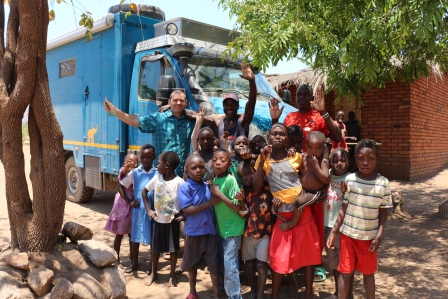
On the other hand, there’s the local trader who generates an immediate and outrageously blatant price-hike for an unwitting foreigner. This, me thinks, is a bit harder to justify. But unless they’re being shamefully greedy, we tend to pay-up. Yes, okay… they’re profiteering. But they’re business people; it’s a supply/demand market and they’ve got a living to make. There’s something demeaning about bartering for 10 minutes to save just a few shekels off a bag of beans, when those few shekels mean far more to the seller than to us. But if it’s a ridiculously high mark-up, we’ve learned to walk away. Maybe they’ll get the message, maybe they won’t… who knows? But the more tourists (yes… that includes us ‘overlanders’) who courteously reject crazy inflated prices, the less likely the traders are to try it again.
3. Learning about Bribery: Getting Things Done
“Oh, but it’s impossible to drive through [ insert your most lethal, 3rd world country of choice] without paying a ton of bribes”. Ever heard this? We’ve learned that in the vast majority of cases, this pure poppycock. In anything other than the rarest and most dire circumstances, bribery is simply not necessary and the situation can be dealt with in other ways. The said ‘other way’ obviously depends on the situation, but it will almost certainly involve a generous dose of patience, good humour and respect (maybe even eating a bit of Humble Pie?).
If there’s one thing we’ve learned about law enforcement officers the world over (good or bad), it’s that they hate paperwork! And they hate it even more if they know they’re not on strong legal grounds. If an officer alleges we’ve done wrong, we respectfully accept their jurisdiction and insist on the paperwork. No official receipt… no payment. Simples!
Okay, maybe it’s not always ‘simples’; it may take a bit of time and patience, but impatience or bad temper will almost certainly not end well. Some say that little tactics can do the trick, eg: appearing to make a call to your Embassy. Whatever. As long as it’s done with respect and good humour, it’s worth a try. How about making coffee and offering one to the officer and having a friendly chat? This can test their patience to hold out. Reminding them cheerfully that you have your home with you and can stay there all day/night if necessary. Remember, the officer is after a fast buck. Sooner or later they’ll want to go home and will invariably send you on your way with a ‘face saving’ warning.
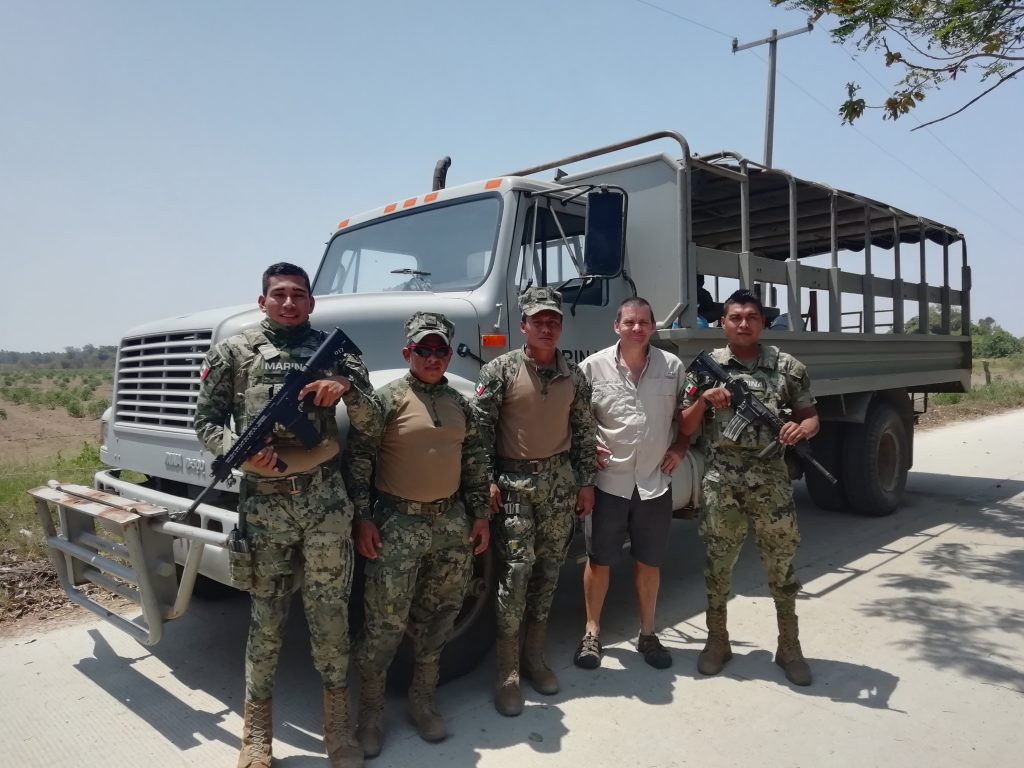
Admitted, there must conceivably be some rare occasion where a clever cop gives you no choice. But this would be rare, certainly far more rare than the number of people who claim they had to pay multiple bribes to drive across Mexico!
To anyone who has coughed-up and paid a corrupt cop, can you honestly say, hand on heart, that you absolutely had to resort to corruption? That you had no other choice? Or was it simply your impatience to be on your way? Could it have gone better if you had taken a different approach? Engaging in corruption at street level is implicit support and encouragement of systematic corruption in higher levels of government. We’ve learned that it’s rarely necessary and never okay.
4. Learning Respect: Photos of Locals
Those cute kids, that characterful old street-trader, those ladies carrying water-jugs on their heads back to their village. Put it on the Insta-bob… look what an ‘authentic’ time we’re having on our travels! I guess we didn’t really give this much thought at the start of our travels, but the first time a lady looked away and shielded her face from our camera, it struck a chord. These are not just part of the scenery and the charm of a country, these are people!
For perspective, we considered how we might feel if we’d popped out to the shops in our home country and noticed someone taking pictures of us from a distance (even worse, close up). We might not be feeling or looking our best, but someone just happens to consider our tatty jeans and spot-stained t-shirt to be a photo-worthy example of our culture’s curious dress-code. And how would a parent or grandparent, in our home country feel if some stranger, a random foreign visitor, took an interest in their child/grandchild playing in the street and took photos of them without consent?
If the image is taken with consent – maybe the fruit seller posing and smiling at the camera or the goat-herder giving a wave and a thumbs-up – then there’s no lovelier evidence of our wonderful, diverse world. But this really isn’t always the case. Social media of the overlanding world is laden with snaps which are clearly taken surreptitiously, sometimes with the subject obviously unaware of the camera and even worse, where they appear to have seen the camera and looked away or hidden their face.
In our home culture this type of photography is considered at best, disrespectful. Yet somehow, when we’re overlanding through another culture, it’s okay to treat people going about their daily lives like candy for a social media following. We’ve learned that if we take the time to engage with people, get to know them, gain their trust and then seek consent for a photo, then it’s a win-win situation. We all gain from a better understanding of each other.
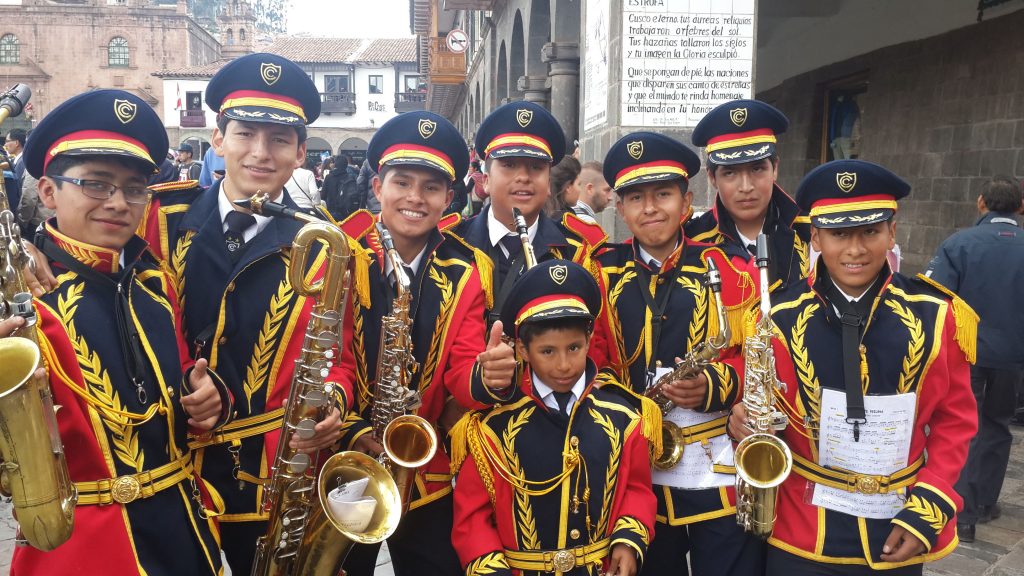
5. Learning to join queues: they’re probably worth it!
Us overlanders… we’re supposed to be pursuing the so-called ‘authentic’ or ‘unique’ travel experience, aren’t we? We’re not on a package-tour to touristy but iconic hotspots like Machu Picchu or the Leaning Tower of Pisa.
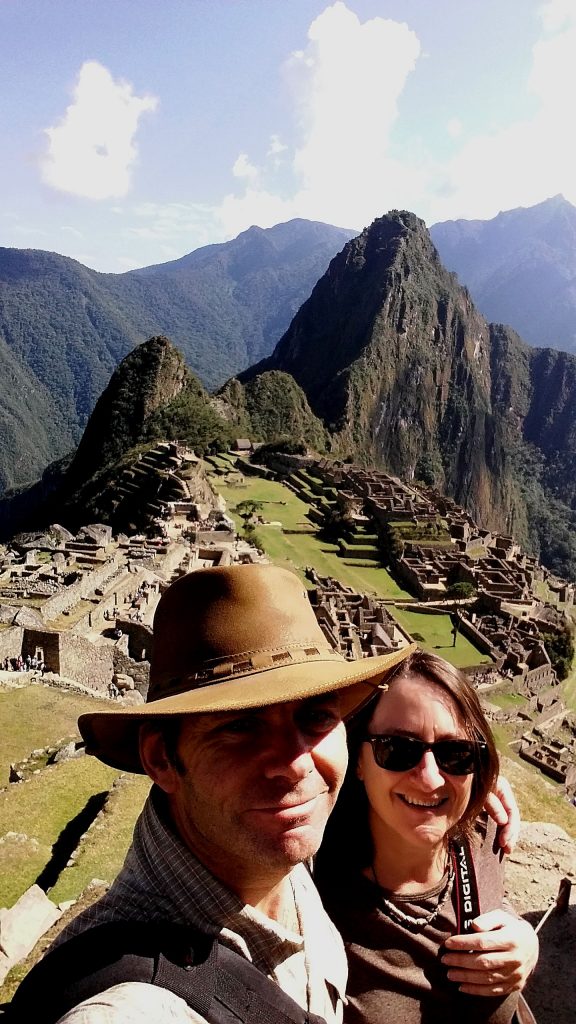
The question is: do we want to join looong queues of tourists in Banff National Park, simply to spend a day crowd-dodging and chasing that special-selfie (avoiding the inadvertent photo-bomb by Fred and Wilma on their annual vacation from Bedrock)? After some pontification, we learned the answers is ‘yes’. We’ve learned not to skip the hot-spots.
The point, we think, is that these hot-spots are hot-spots for a reason. Thousands of people don’t (in non-Covid times at least) spend a fortune flying in from all over the world just to see an ‘average’ mountain view or a ‘mediocre’ pile of ancient rubble. They fly in to see extraordinary mountain views and exceptional piles of ancient rubble. These spots are worth the hassle.
We queued for over an hour to go up to Christ the Redeemer in Rio de Janeiro, and almost two hours to see inside the Duomo in Florence. In Banff we got up at 04:30hrs to get a space at Moraine Lake, to see a sunrise which (sensibly) stays in bed below the horizon until around 07:30hrs! There are many more examples of us suffering overlanding hardship (😉) just to see a hot-spot. But what we’ve learned, is that they’re usually worth it!
6. Learning about Professional Overlanders: ‘Fake News’?
There are awesome overlanders out there who not only think, but operate ‘outside the box’. They’ve found ingenious ways to continue their careers remotely whilst on the road. It’s so cool how, with high-speed internet (which, by the way, is very widely available in the developing world now) and a bit of imagination, they have adapted their careers to overland and earn at the same time. We have big respect for people who realised the remote-working concept well before Covid lock-down brought it into vogue.
But there’s another category of overlander earning a living: the professional overlander. These guys turn the travel itself into a business, asking sponsors (and maybe even you) to pay them to travel. They might, for example, obtain advertising and sponsorship on the back of their hard-won substantial social media following. They might persuade you to subscribe to their Patreon account to see their very cool pics and videos and to read about their travels. They might give fee-based presentations about their adventures, their rig or their kit.
Some of these, notwithstanding the sponsorship aspect, are fabulously inspirational accounts which modestly underplay the extent of the real adventures behind them. But we’ve learned (just occasionally) to be a teeny bit suspicious about the sharing of some impressive looking pics and stories… the picture might not quite be all that it seems!
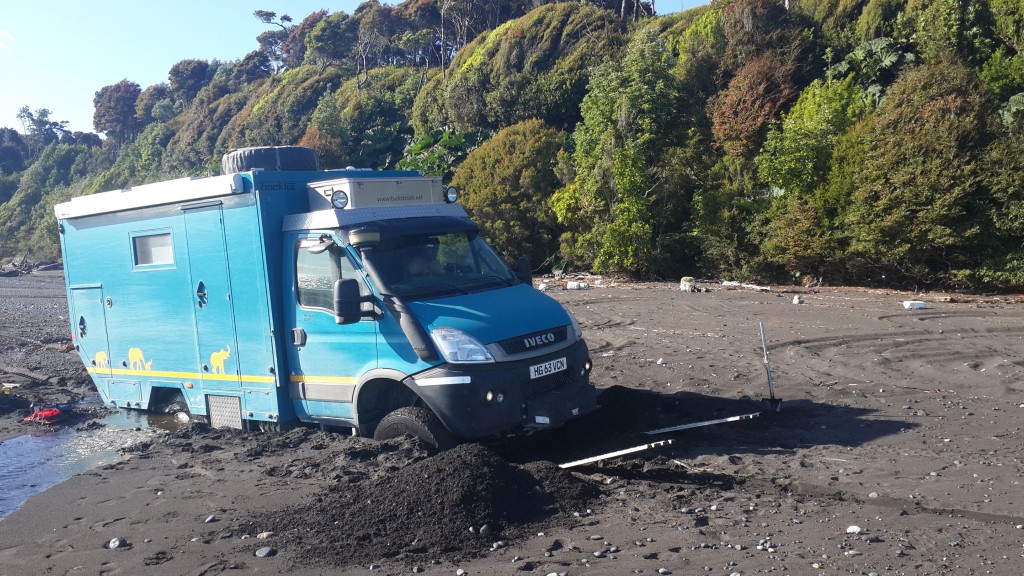
One guy we met explained how he funded his travel with journalism, photography and presentations. But after a few beers he admitted that of course, to earn money from adventure travel, it pays to embellish the story slightly! A photo of your overland vehicle apparently stuck in a remote river-crossing in central Africa and a painful account of hours spent extracting it from said river, generates interest. Explaining that in reality however, you simply drove a little way into the hard shore of the river, climbed onto the adjacent road bridge to take a photo, then reversed out of the water to drive over the bridge, does not paint the same picture of ‘adventure travel’!! Most overlanders will of course get genuinely stuck very occasionally… but very few of them make money from the tales.
An overlander’s tale of negotiating with a corrupt policeman who was almost certainly going to shoot him and eat his dog, makes a good story which you can choose to believe or not. We’ve learned that if there are sponsorships, viewing charges, book sales or whatever income behind the show… the tale just might (occasionally) fall into the category of what one recently departed President would call ‘fake news‘ 😉
***********
So that’s six little nuggets of wisdom we’ve gleaned from our time overlanding so far. Oh… and if you’re wondering about the orange jam/marmalade thing… we’ll let you know when we’ve toured the marmalade mines 😉
